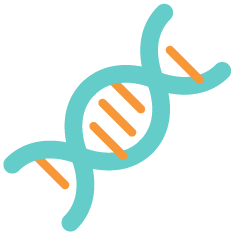After we test your tumor tissue, blood, or bone marrow sample for genomic alterations, we will report any alterations found.

Our Testing Process
Know What to Expect, So You Can Move Forward
If you’re considering biomarker testing, you may be wondering how much time it may take before you can start making treatment decisions with your doctor. Click through key milestones below to feel prepared and confident about what’s ahead.*
A closer look at our biomarker testing process
Here are the five basic steps of our process to keep in mind:

Step 1
Talk to your doctor
You and your doctor talk about testing options together. Your doctor orders the appropriate Foundation Medicine test.

Step 2
Collect a sample
Your doctor sends a tissue or blood sample to Foundation Medicine for testing. You may already have a tissue sample available, or a new biopsy may be required. If a liquid biopsy sample is needed for testing, patients can have it done at a doctor’s office or lab. Foundation Medicine also offers mobile phlebotomy services—known as in-home blood draws—at no additional cost.

Step 3
Have your sample analyzed in our lab
Foundation Medicine analyzes your sample to find cancer-related genomic alterations and biomarkers.

Step 4
Receive your results
Your doctor receives results in a Foundation Medicine report.

Step 5
Your doctor receives your report.
You and your doctor discuss the results and next steps for treatments. The information in the report may indicate if a targeted therapy, immunotherapy, or clinical trial could be an option for you. You can also request a copy of your report by contacting our Client Services Team at client.services@foundationmedicine.com or by calling (888) 988-3639.
What do the results mean?
When testing is complete, a report will be sent to your doctor. You can also request a copy of your report by contacting us.
*Every person’s advanced cancer journey may look different.
Important Safety Information
FoundationOne®CDx and FoundationOne®Liquid CDx are qualitative next-generation sequencing based in vitro diagnostic tests for advanced cancer patients with solid tumors and are for prescription use only. FoundationOne CDx utilizes FFPE tissue and analyzes 324 genes as well as genomic signatures. FoundationOne Liquid CDx analyzes 324 genes utilizing circulating cell-free DNA and is FDA-approved to report short variants in 311 genes. The tests are companion diagnostics to identify patients who may benefit from treatment with specific therapies in accordance with the therapeutic product labeling. Additional genomic findings may be reported and are not prescriptive or conclusive for labeled use of any specific therapeutic product. Use of the tests does not guarantee a patient will be matched to a treatment. A negative result does not rule out the presence of an alteration. Some patients may require a biopsy for testing with FoundationOne CDx when archival tissue is not available which may pose a risk. When considering eligibility for ROZLYTREK® based on the detection of NTRK1/2/3 and ROS1 fusions, or for TEPMETKO® based on the detection of MET SNVs and indels that lead to MET exon 14 skipping, testing using plasma specimens is only appropriate for patients for whom tumor tissue is not available for testing. Patients who are tested with FoundationOne Liquid CDx and are negative for other companion diagnostic mutations should be reflexed to tumor tissue testing and mutation status confirmed using an FDA-approved tumor tissue test, if feasible. For the complete label, including companion diagnostic indications and important risk information, please visit www.F1CDxLabel.com and www.F1LCDxLabel.com.



